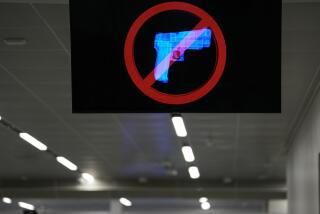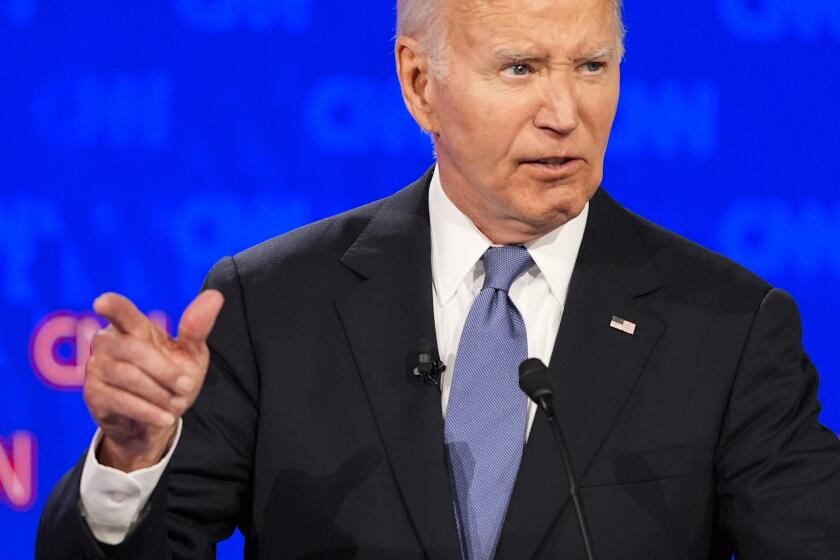Supreme Court turns down a 2nd Amendment challenge to state bans on assault weapons

The Supreme Court on Tuesday turned down a 2nd Amendment challenge to state laws in Illinois that prohibited the sale of rapid-fire assault weapons.
Justices Clarence Thomas and Samuel A. Alito Jr. dissented.
Had the court granted the appeals, it would have threatened California’s long-standing ban of most rapid-fire assault rifles as well.
Thomas said the court refused to hear the appeals now because the cases are still pending in the lower courts. “I hope we will consider the important issues presented by these petitions after the cases reach final judgment,” he wrote.
Tuesday’s order suggests the justices are not anxious to rule on rapid-fire guns at this time, but it probably does not signal the majority leans in favor of upholding these laws.
In the brief order, the justices said they would not review a ruling by the 7th Circuit Court of Appeals in Chicago, which in a 2-1 vote refused to block a new Illinois law that forbids the sale of semiautomatic rifles and pistols as well as large-capacity magazines.
A rundown of the 10 most significant Supreme Court rulings of the 2024 term.
The measure was enacted last year after a shooter armed with an AR-15-style rifle and 30-round magazines fired 83 rounds in less than a minute, killing seven people and wounding 48, at an Independence Day parade in Highland Park, a suburb of Chicago.
At issue was whether the state’s ban on these popular but potentially dangerous weapons violates the 2nd Amendment and the right to “keep and bear arms.”
The National Foundation for Gun Rights called Tuesday’s order a temporary setback.
“For now at least, the 2nd Amendment is a second-class right, and it will remain so until the Supreme Court decides to stop ducking the issue,” said Hannah Hill, the group’s executive director. The case will now proceed to the discovery, trial, and summary judgment phases at the district court, she added.
When the Supreme Court first upheld individual gun rights in 2008, Justice Antonin Scalia said the 2nd Amendment protects firearms that are “in common use” but not “dangerous and unusual weapons.”
Those comments shape the current debate.
Gun-rights advocates say semiautomatic rifles and handguns are in common use. They are among the most popular weapons in this country, they say, and may be used for self-defense and target shooting.
State legislators and gun-control advocates stress the danger posed by rapid-fire weapons that can shoot dozens of rounds. They describe AR-15 style guns as weapons of war and the weapon of choice in mass shootings.
The Supreme Court ruled that former President Trump cannot be prosecuted for his official acts while in office.
In addition to California and Illinois, the states of Connecticut, Delaware, Hawaii, Maryland, Massachusetts, New Jersey, New York and Washington also forbid most semiautomatic rifles.
In the past, both Thomas and Justice Brett M. Kavanaugh have dissented from decisions upholding bans on assault weapons.
In upholding the Illinois law, 7th Circuit Judge Diane Wood said courts had historically made a distinction between military-style weapons like the M-16 rifle and guns that were for private use.
“These assault weapons and high-capacity magazines are much more like machine guns and military-grade weaponry than they are like the many different types of firearms that are used for individual self-defense,” she wrote in an opinion joined by Judge Frank Easterbrook. “Indeed, the AR-15 is almost the same gun as the M-16 machine gun.”
Separately, the 9th Circuit Court in San Francisco is weighing a 2nd Amendment challenge to California’s ban on assault weapons.
More to Read
Start your day right
Sign up for Essential California for news, features and recommendations from the L.A. Times and beyond in your inbox six days a week.
You may occasionally receive promotional content from the Los Angeles Times.









